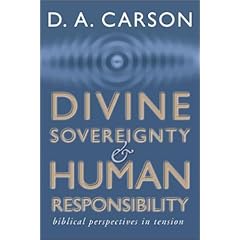
"The sovereignty-responsibility tension is not a problem to be solved; rather, it is a framework to be explored." (2)
"Once again, then, the divine activity calls for a response, not fatalism; while human calling and seeking do not make the divine activity contingent." (14)
"The point is so obvious that it scarcely requires making. From the first prohibition in Eden, through commands to individuals like Noah and Abraham -whether commands to build an ark or to walk blamelessly- to the prescriptions laid on the covenant people, human responsibility is presupposed." (18)
"Men are not held to be responsible in some merely abstract fashion; they are responsible to someone." (19)
"It is difficult to find an adequate word or phrase to express this 'ultimacy' in God. The crucial point is that his activity is so sovereign and detailed that nothing can take place in the world of men without at least his permission; and conversely, if he sets himself against some course, then that course cannot develop." (28)
"...the Old Testament writers do not shy away from making Yahweh himself in some mysterious way (the mysteriousness of which safeguards him from being himself charged with evil) the 'ultimate' cause of many evils." (28)
"To fail to acknowledge Yahweh's ultimacy-to fail to praise-is not real independence from divine dominion, but overt rebellion, a misguided declaration of self-dependence. The absoluteness of divine sovereignty and the reality of human responsibility meet in the human obligation to acknowledge divine sovereignty with grateful humility." (34-5)
"In short, although we may lack the categories needed for full exposition of the problem, nevertheless we must insist that divine ultimacy stands behind good and evil asymmetrically." (36-7)
"In the case of both Caiaphas and Judas, therefore, divine ultimacy even behind evil actions is presupposed. But divine ultimacy operates in some mysterious way so that human responsibility is in no way mitigated, while the divine being is in no way tarnished. In particular, Judas is responsible even when Satan is using him; but over both stands the sovereignty of God." (132)
"There is a sense in which God's love is directed to the 'world' per se; but to absolutise the passage where this is enunciated is to fail to recognize the even more numerous passages in which the divine love is restricted to the elect, while unbelievers sit under wrath and judgment." (197)
"Hence it [John's gospel] feels no embarrassment at picturing God's control and purposes over events themselves evil. God is neither tainted not thwarted by evil actions. Indeed, his purposes in salvation history are being fulfilled even by such actions. Men for their part do not find their responsibility lessened by God's sovereign reign." (202-3)
"It must be protested that although the various time/eternity models serve a useful purpose as bases for discussion, they are in no sense explanatory solutions of the sovereignty-responsibility tension. That would be to explain the obscure by the more obscure." (210)
"The example of Job is particularly instructive. Job and his friends stress equally that God is all-powerful and perfectly good; but the message of a book as a whole is that their conception of God is not high enough. God's ways are unfathomable; his knowledge, limitless; his power, effectual; who can tell him he is wrong? What man has arrogance to deny divine providence by ignorant words? No simple solution is possible, for men with their limited knowledge cannot judge God's government. Man's peace must come from knowing and trusting this God. It is significant that Job cries out in the end, not "I understand!" but "I repent." " (217)
No comments:
Post a Comment